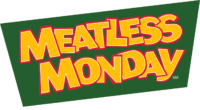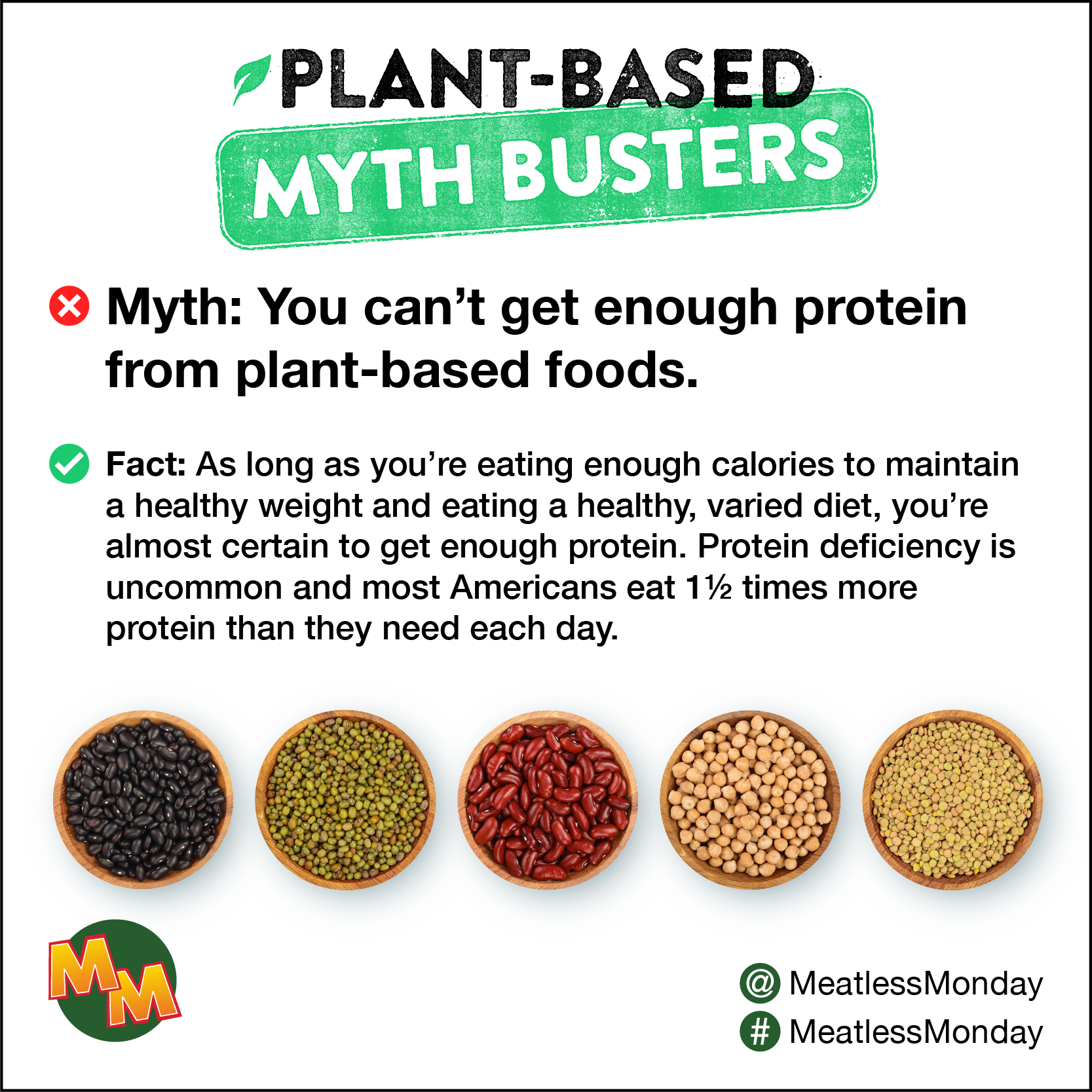Common Myths and Facts About Plant-Based Eating
When it comes to nutrition, it’s hard to know what to believe. Many of the myths surrounding plant-based eating originate from a general misunderstanding. False or conflicting information circulates quickly, which makes it difficult to stay up-to-date on the latest developments.
There are many misconceptions regarding the health/palatability/safety of eating a plant-based diet, but this Monday, we’re doing our best to dispel these myths with credible science and research. Check out our list of plant-based eating myths below so you can fearlessly add more diversity to your diet.
Myth: You Can’t Get Enough Protein Eating Only Plants
Fact: As long as you’re eating enough calories to maintain a healthy weight and eating a healthy, varied diet, you’re almost certain to get enough protein. Protein deficiency is not common in the United States and most Americans eat 1½ times more protein than they need each day. Many plant-based foods are loaded with protein, but you might have to eat more of them to match amount of protein found in animal products. For example, it takes 1 cup of cooked beans to equal the amount of protein in a 3-ounce portion of meat. If you’re worried about getting enough protein, it’s easy to add a scoop of plant-based protein powder to your morning smoothie if you’re looking for an extra boost.
Myth: You have to eat specific combinations of plant-based foods to get a complete protein.
Fact: Your body naturally combines plant-based nutrients to form a complete protein. Although most plant protein sources provide limited amounts of some of the essential amino acids, it isn’t necessary to combine foods to create “complete proteins.” If you eat a variety of foods and follow the USDA Dietary Guidelines, your body will have all the amino acids it needs to make the new proteins your body needs. In other words, your body “completes” the protein for you, even if each item was eaten at a different meal.
Myth: Plant-Based Eaters are Anemic (Iron Deficient)
Fact: Plant-based ingredients like lentils, chickpeas, dark leafy greens, chia and hemp seeds, and dried fruits contain varying amounts of iron. It’s true that iron found in meat (heme iron) is more easily absorbed by the body than iron from plant-based products (non-heme iron). However, research shows that eating foods that contain vitamin C or other heme-containing foods together with the plant protein enhances the iron’s availability. For example, a bowl of beans with chopped red peppers or tofu with broccoli.
Myth: Kids Don’t Like Vegetables
Fact: Many kids enjoy vegetables and healthy foods, especially when they help cook. When vegetables like broccoli, Brussels sprouts, cauliflower, and asparagus are prepared well, kids love them. Better yet, when kids actually participate in the selection and cooking processes, they’re likely to enjoy their veggies even more. To introduce kids to new plant-based foods, try making dishes that they recognize and enjoy, such as turning cauliflower into Buffalo nuggets or transforming eggplants and onions into “meatballs.”
Myth: Plant-Based Diets are Nutrient Deficient
Fact: It’s easy to get all of the nutrients you need without eating meat. In the United States only a small percentage of the population is deficient in any one nutrient. That’s because many of the foods we eat either provide us with the necessary amounts of vitamins and minerals, or have them added through fortification. Strictly plant-based eaters may need to take a vitamin B12 or iron supplement, but it’s also easy to consume enough of these nutrients through daily servings of commonly fortified plant-based foods such as milks, cereals, or other verities of fortified foods.
Myth: Vegan = Healthy
Fact: Not all plant-based foods are healthy, many vegan processed foods contain high amounts of sugar, salt and saturated fats. There is a consensus amongst health professionals that a diet consisting primarily of minimally processed fruits, vegetables, legumes, and grains is best for your physical wellbeing. But that doesn’t mean all vegan or plant-based foods meet these requirements. When an ingredient is heavily processed, many of the beneficial nutrients could be stripped away. French fries, potato chips, onion rings, cupcakes, and sugary cereals are all technically free of animal products, but that fact alone doesn’t make these foods nutritious.
Myth: There Aren’t Many Plant-Based Eating Options
Fact: You can enjoy most of your favorite foods made plant-based. There’s the misconception that plant-based eating is boring and limited to salads, but by making the commitment to eat more fruits, vegetables, legumes, and grains, you’re opening yourself up to thousands of new ingredients and flavors. Plant-based eating isn’t limiting; it’s limitless. Check out the Meatless Monday recipe collection and even your favorite burger restaurants serving meatless options.
Myth: I Can’t Live Without Meat
Fact: It’s never been easier to find satisfying plant-based meats. Today, there are so many ways to capture the texture, flavor, and essence of meat using only plant-based ingredients. Besides the impressive creations from Beyond Meat and Impossible foods, there are hundreds of different combinations of vegetables, legumes, and grains that can offer the same satisfaction as traditional animal products. Umami rich ingredients like soy sauce, tomato paste, or shiitake mushrooms can also be used to replicate meat’s savory flavor.
Myth: You Need Dairy for Strong Bones
Fact: Cow’s milk is not the only or best source of calcium available. Dark leafy greens like kale, bok choy, and mustard greens are good sources of calcium, and it’s also common for fruit juices, specifically orange juice, and plant milks to be fortified with extra calcium. Learn more about plant-based calcium sources and ways to increase and maintain calcium levels from the Physicians Committee for Responsible Medicine.
Myth: A Plant-Based Diet Isn’t Safe for Children
Fact: The American Academy of Pediatrics states that eating a plant-based diet can be a beneficial choice for your family. Children, like adults, need a balanced diet that includes a variety of vitamins and minerals. To account for any missing nutrients — the more common ones being B12, iron, calcium, and zinc — simply incorporate more fortified foods like breakfast cereals, plant milks, or supplements into weekly meal planning.
Myth: Eating Soy Increases Risk of Cancer
Fact: Soy does not increase your risk of breast cancer, it might actually help lower it. The soybean is a rich source of plant-based protein, and although they’ve been a staple of East-Asian diets for centuries, there’s a myth that eating too much soy can increase the risk of breast cancer. However, experts from the American Cancer Society declare that soy is perfectly safe for both women and men to consume. “So far, the evidence does not point to any dangers from eating soy in people, and the health benefits appear to outweigh any potential risk. In fact, there is growing evidence that eating traditional soy foods such as tofu, tempeh, edamame, miso, and soy milk may lower the risk of breast cancer, especially among Asian women. Soy foods are excellent sources of protein, especially when they replace other, less healthy foods such as animal fats and red or processed meats. Soy foods have been linked to lower rates of heart disease and may even help lower cholesterol.”

